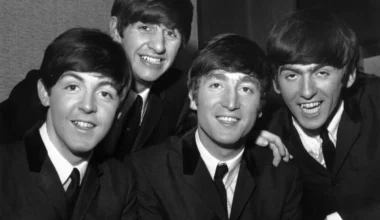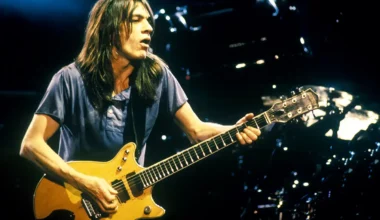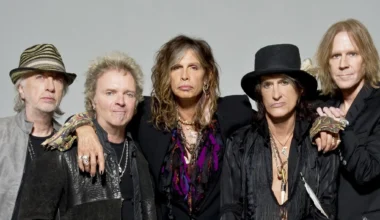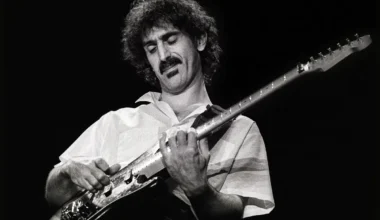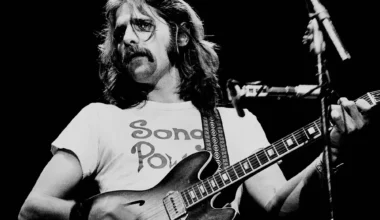Kurt Cobain, the late Nirvana frontman, is one of the most iconic names in rock history. Thanks to his groundbreaking work in the late 1980s and early 1990s in bringing grunge music to the forefront of popular rock. The tragic and untimely death of the icon in April 1994 frequently overshadows memories of his musical accomplishments.
A destructive relationship with drugs caused Cobain’s death, as it did for Jimi Hendrix, Jim Morrison, Janis Joplin, and Amy Winehouse. Cobain turned in on himself due to a spiraling heroin addiction and a struggle with the spotlight. Unfortunately, the 27-year-old designer felt he had no one to turn to and no hope for the future.
After his death, Cobain’s family, friends, and fans discovered a suicide note he had written before taking his own life. He wrote the haunting words, “It’s better to burn out than fade away,” from Neil Young’s classic 1979 song “Hey Hey, My My (Into The Black),” in his final letter.
“He was forced to do tours when he didn’t want to. He was forced into all kinds of stuff,” Young said of Cobain’s struggles. “I was trying to contact him because I had heard some of the things he was doing to himself. I just wanted to tell him that it’s OK not to tour. It’s OK not to do these things, just take control of your life and make your music.” Or, hey, stop making music. “You’re screwed the moment you feel like you’re out there acting.”
“I think he knew that instinctively, but he was young, and he didn’t have a lot of self-control,” Young concluded. And who knows what other personal things in his life were weighing on him at the time?”
In the run-up to Cobain’s suicide, several notable figures and friends in the music industry became aware of his precarious state, including the R.E.M. frontman Michael Stipe. As it transpires, Pete Townshend, the guitarist and creative lead of The Who was also alerted to the situation.
“Kurt Cobain was in deep trouble with heroin addiction in 1993,” Townshend wrote in the Guardian in 2002.”I was visiting New York regularly for my own child abuse story, Tommy, which had hit Broadway.” I met Michael Azerrad, the author of Nirvana: Come As You Are. Azerrad asked if I would contact Kurt Cobain, who was constantly on the verge of overdosing. After 11 years, I decided to give alcohol another chance this year. When Azerrad approached me, I wasn’t drunk or unsympathetic. However, I didn’t make the necessary judgment, which I would make today, that saving his life required an immediate ‘intervention.’
He avoided drugs for the majority of his youth. But Townshend struggled with alcoholism in the late 1960s and early 1970s. Following the death of The Who’s founding drummer, Keith Moon, in 1978, Townshend became addicted to heroin. But he eventually recovered from it. Townshend, like Cobain, had his share of close calls.
Townshend told The Irish Times in 2019 about an evening with Phil Lynott in the 1980s when he overdosed on heroin. “We had a great night out in [promoter] Steve Strange’s Club for Heroes in London once. It was with people like Paul Weller and Chrissy Wood, Ronnie Wood’s ex-wife,” he told me. “I woke up with a needle in my arm, and Phil, standing there, looking at me passed out.”
“Do you want to know what my biggest disappointment was? That I wasn’t on the front page of the newspaper the following morning. “I was in a club with Paul Weller and Phil Lynott. and it was the only time in my life that I would overdose, and no one knew”. Townshend reflected.
Townshend continued in his 2002 Guardian article, in which he reviewed the publication of Cobain’s Journals. “It is desperately sad for me to sit here, 57 years old, and contemplate how often wasteful the deaths of those in the rock industry.” We find it so hard to save our own. But must take responsibility for the fact that the message of death Kurt Cobain sends to his fans is that it is in some way heroic to scream at the world, thrash a guitar, smash it up, and then overdose.”
Townshend agreed to read Cobain’s Journals, in part because one of his lyrics was quoted. “I hope I die before I become Pete Townshend.” This adapted line from The Who’s early single ‘My Generation’ carries the same weight as the previously mentioned Neil Young quote. It’s with the original line reading, “I hope I die before I get old.”
“The scribblings of a crazed and depressed drug addict in the midst of what those of us who have been through drug rehab describe as ‘stinking thinking’.” Townshend wrote this in his assessment of the book. Finally, he called the publication of Cobain’s notes “a despicable exercise in sensationalist rock necrophilia.”


